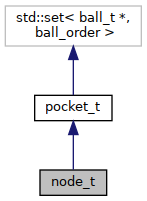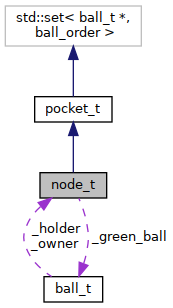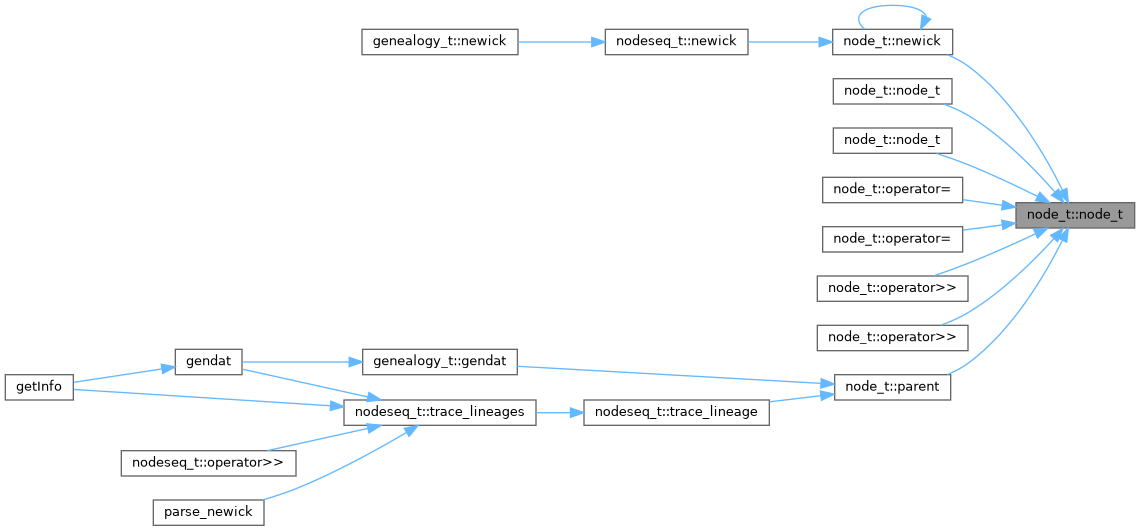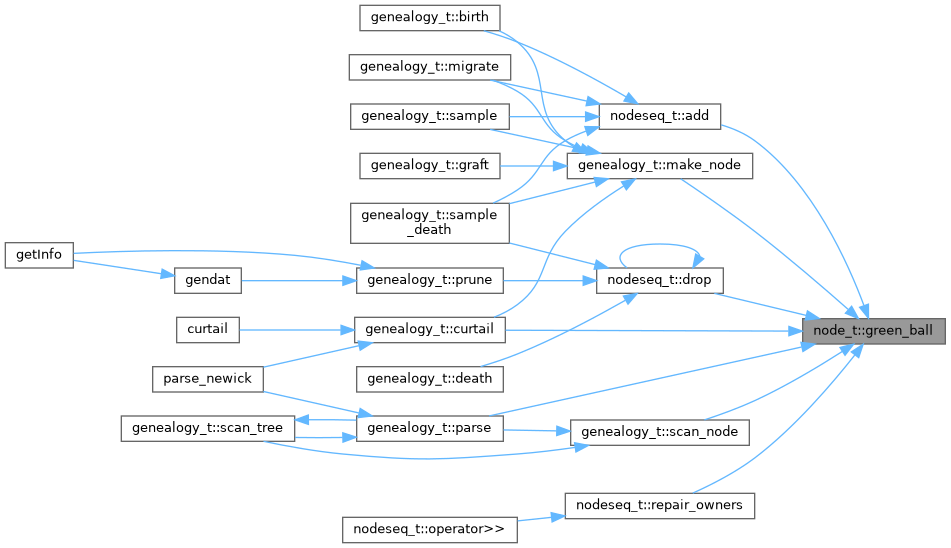Loading...
Searching...
No Matches
node_t Class Reference
Encodes a genealogical node. More...
#include <node.h>
Inheritance diagram for node_t:

Collaboration diagram for node_t:

Public Member Functions | |
| size_t | bytesize (void) const |
| size of binary serialization | |
| node_t (name_t u=0, slate_t t=R_NaReal) | |
| basic constructor for node class | |
| node_t (const node_t &p)=delete | |
| copy constructor | |
| node_t (node_t &&p)=delete | |
| move constructor | |
| node_t & | operator= (const node_t &p)=delete |
| copy assignment operator | |
| node_t & | operator= (node_t &&p)=delete |
| move assignment operator | |
| ~node_t (void) | |
| destructor | |
| ball_t * | green_ball (void) const |
| pointer to my green ball | |
| ball_t *& | green_ball (void) |
| set green ball | |
| name_t | deme (void) const |
| view deme | |
| name_t & | deme (void) |
| set deme | |
| name_t | lineage (void) const |
| view lineage | |
| name_t | lineage (const ball_t *g) const |
| view lineage associated with a green ball | |
| name_t & | lineage (void) |
| set lineage | |
| node_t * | parent (void) const |
| bool | holds_own (void) const |
| bool | is_root (void) const |
| bool | dead_root (void) const |
| int | nchildren (void) const |
| number of descendants | |
| void | lineage_incr (int *incr, int *sat, int *etype) const |
| std::string | describe (void) const |
| human-readable info | |
| std::string | yaml (std::string tab="") const |
| machine-readable info | |
| SEXP | structure (void) const |
| R list description. | |
| std::string | newick (const slate_t &tnow, const slate_t &tpar) const |
| Newick format. | |
 Public Member Functions inherited from pocket_t Public Member Functions inherited from pocket_t | |
| size_t | bytesize (void) const |
| size of binary serialization | |
| void | repair_owners (const std::unordered_map< name_t, node_t * > &node_name, std::unordered_map< name_t, ball_t * > *ball_name) |
| ~pocket_t (void) | |
| destructor | |
| bool | holds (ball_t *b) const |
| does this node hold the given ball? | |
| bool | holds (color_t c) const |
| does this node hold a ball of this color? | |
| ball_t * | first_ball (void) const |
| retrieve the first ball | |
| ball_t * | last_ball (void) const |
| retrieve the last ball | |
| ball_t * | ball (const color_t c) const |
| retrieve the first ball of the specified color. | |
| ball_t * | other (const ball_t *b) const |
| return a pointer to another ball | |
| std::string | describe (void) const |
| human-readable info | |
| SEXP | structure (void) const |
| R list description. | |
| std::string | yaml (std::string tab="") const |
| human/machine-readable info | |
Data Fields | |
| name_t | uniq |
| slate_t | slate |
Private Member Functions | |
| void | clean (void) |
Private Attributes | |
| ball_t * | _green_ball |
| name_t | _lineage |
Friends | |
| raw_t * | operator>> (const node_t &p, raw_t *o) |
| binary serialization of node_t | |
| raw_t * | operator>> (raw_t *o, node_t &p) |
| binary deserialization of node_t | |
Additional Inherited Members | |
 Protected Member Functions inherited from pocket_t Protected Member Functions inherited from pocket_t | |
| void | repair_holder (node_t *p) |
Detailed Description
Encodes a genealogical node.
Each node has:
- a unique name (uniq)
- a pocket containting two or more balls
- a "slate" with the time
- a lineage
- a pointer to its own green ball
Constructor & Destructor Documentation
◆ node_t() [1/3]
basic constructor for node class
Definition at line 66 of file node.h.
Here is the caller graph for this function:

◆ node_t() [2/3]
|
delete |
copy constructor
Here is the call graph for this function:

◆ node_t() [3/3]
|
delete |
move constructor
Here is the call graph for this function:

◆ ~node_t()
|
inline |
Member Function Documentation
◆ bytesize()
|
inline |
size of binary serialization
Definition at line 40 of file node.h.
Here is the call graph for this function:

Here is the caller graph for this function:

◆ clean()
|
inlineprivate |
◆ dead_root()
|
inline |
◆ deme() [1/2]
|
inline |
◆ deme() [2/2]
|
inline |
◆ describe()
|
inline |
◆ green_ball() [1/2]
|
inline |
◆ green_ball() [2/2]
|
inline |
◆ holds_own()
|
inline |
◆ is_root()
|
inline |
◆ lineage() [1/3]
◆ lineage() [2/3]
|
inline |
◆ lineage() [3/3]
|
inline |
◆ lineage_incr()
|
inline |
lineage count, saturation, and event-type types are:
- 0 = non-event
- -1 = root
- 1 = sample
- 2 = non-sample node
Definition at line 151 of file node.h.
151 {
153 incr[d]--;
154 for (ball_t *b : *this) {
157 incr[b->deme()]++;
158 sat[b->deme()]++;
159 break;
160 default:
161 break;
162 }
163 }
165 sat[d]--;
166 etype[d] = -1;
168 etype[d] = 1;
169 } else {
170 etype[d] = 2;
171 }
172 };
Here is the call graph for this function:

Here is the caller graph for this function:

◆ nchildren()
|
inline |
◆ newick()
Newick format.
Definition at line 214 of file node.h.
214 {
215 std::string o1 = "", o2 = "", o3 = "";
218 o1 = "("; o3 = ")";
219 }
221 o3 += "b_";
223 o3 += "m_";
224 } else {
225 o3 += "g_";
226 }
227 n = 0;
228 for (ball_t *b : *this) {
229 node_t *p = 0;
232 p = b->child();
233 if (p != this) {
236 }
237 break;
241 break;
243 break;
244 }
245 }
246 return o1 + o2 + o3
247 + std::to_string(deme())
250 };
std::string newick(const slate_t &tnow, const slate_t &tpar) const
Newick format.
Definition node.h:214
Here is the call graph for this function:

Here is the caller graph for this function:

◆ operator=() [1/2]
copy assignment operator
Here is the call graph for this function:

◆ operator=() [2/2]
move assignment operator
Here is the call graph for this function:

◆ parent()
|
inline |
◆ structure()
|
inline |
R list description.
Definition at line 201 of file node.h.
201 {
202 SEXP O, On;
203 PROTECT(O = NEW_LIST(4));
204 PROTECT(On = NEW_CHARACTER(4));
209 SET_NAMES(O,On);
210 UNPROTECT(2);
211 return O;
212 };
static int set_list_elem(SEXP list, SEXP names, SEXP element, const char *name, int pos)
Definition internal.h:67
Here is the call graph for this function:

Here is the caller graph for this function:

◆ yaml()
|
inline |
machine-readable info
Definition at line 189 of file node.h.
189 {
190 std::string t = tab + " ";
196 }
198 return o;
199 };
Here is the call graph for this function:

Here is the caller graph for this function:

Friends And Related Symbol Documentation
◆ operator>> [1/2]
◆ operator>> [2/2]
Field Documentation
◆ _green_ball
◆ _lineage
◆ slate
◆ uniq
The documentation for this class was generated from the following file:
- src/node.h
















